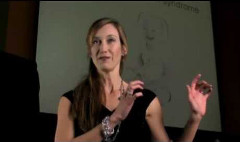Advice for Doctors Seeking to Explore Non-Clinical Career Opportunities
 Happy February!
Happy February!
I love February because I consider it my real “New Year.” I’m always too busy in January with the twin’s birthday plans, putting away holiday gifts and decorations, and catching up on things that were neglected in December to really appreciate the New Year. Once February hits, I take a few days to reflect upon my past year and to plan my new one.
I hope that your plans for this year include moving forward with your career transition. I was recently interviewed about my experiences in leaving full-time medical practice for a non-clinical career, and asked what advice I would give to other doctors starting out. Here are the tips I provided.
What advice would you give other doctors who want to begin exploring non-clinical opportunities?
- 1. Know these facts:a. There are many careers for which you are qualified.
b. Career options exist in which you will make as much as or more money than you currently earn.
c. Many other doctors have successfully transitioned to new careers; you are not alone in your desire for change.
d. Transitioning is a step forward. Your prior education, time, and money are not wasted but instead give you invaluable experiences and knowledge that can position you for exciting and rewarding opportunities.
e. There are more career options than you can imagine; there are opportunities you have never even heard of.
- 2. Commit to the decision that you will pursue a more rewarding career or make changes to your current situation to bring you increased satisfaction. This is a process that takes some time; vow to start today. If you are unhappy, that is only going to get worse.
 3. Identify people you can talk to. You will need friends and mentors to talk with during this process, for support and for brainstorming. Friends have a different perspective and often have helpful ideas on careers you would be good at. Also, identify people you can NOT talk to, who are not supportive. Interestingly, I discovered I could not discuss my desire for change with my mother, of all people!
3. Identify people you can talk to. You will need friends and mentors to talk with during this process, for support and for brainstorming. Friends have a different perspective and often have helpful ideas on careers you would be good at. Also, identify people you can NOT talk to, who are not supportive. Interestingly, I discovered I could not discuss my desire for change with my mother, of all people!- 4. Do NOT jump into getting another degree. This is one of the biggest mistakes I see. The most common degrees doctors decide to pursue are an MBA or MPH. Yes, there is a chance down the road that you will need more training, education, or a degree. But – there is a chance you won’t. You need to first spend the time figuring out what career you are going to pursue before you spend time and money on additional education. Obtaining those degrees will give you more credentials and give you more options of careers you could do – but obtaining those degrees won’t help you decide what you want to do.Why do doctors make this mistake? Taking more classes is familiar to us; it’s what we have always done to further our career; we take a class and get a degree. Taking a class feels safe compared to stepping out into the unknown of the career search.
- 5. Get help. Coaches and consultants can lead you through the exact steps in the process, saving you time, energy, money, and frustration. Transitioning is unlike your prior career path because there is no predetermined course. When you became a doctor, every step was outlined for you –which class and tests to take, how to apply for residency, etc. You also knew exactly how long it would take. The process of transitioning is like starting out on a trip –you’ve decided to take a journey – but you don’t know the final destination. Therefore, you wouldn’t know what to pack, how to prepare, which road to take, or how long it would take. You can reach your destination alone but seeking assistance from someone who has taken the trip before will get you there faster and more efficiently.
- 6. Learn how to network. Networking is potentially the number 1 way to find your new career. When I started out, I thought networking was something business people did over lunch. I didn’t understand how to network and I didn’t realize the value. I didn’t even want to network and avoided it because of the pride issue. Again, as physicians we are used to working independently and not used to reaching out and connecting with others. Networking has been critical to my success; plus, it is fun. Through networking I was asked to film a commercial for a national food company.
- 7. You CAN do this, no matter your situation. We all have excuses for why we can’t start a new career but the truth is, you can find a way if your happiness is a priority. Common excuses include: not enough time to pursue a new career, worries about financial security, and wondering what family will think.I overcame many obstacles to my new career including having a child with special needs, another child with multiple medical problems, and an injury. Other physicians have overcome financial issues, divorces, major illnesses, and disability. The point is- you can do this, no matter what your situation. You just have to take the first step. It may take time and hard work, but you will achieve career happiness – which will improve all aspects of your life.
 8. Speaking is a great way to start and within your reach. You have the knowledge to speak and there is little investment of time and money to get started. After you start speaking and begin to narrow down your area of expertise, it’s a natural and easy progression to write, consult, and develop products.Speaking is the way I began my new career, and it continues to be vital to each of my businesses. It was also the LAST thing I thought I would ever do, as by nature I am shy and used to fear public speaking. Now it is one of my favorite aspects of my career. If you have considered speaking – or if you have rejected speaking thinking it doesn’t fit your personality – give me a call and we will discuss! Many opportunities await you.
8. Speaking is a great way to start and within your reach. You have the knowledge to speak and there is little investment of time and money to get started. After you start speaking and begin to narrow down your area of expertise, it’s a natural and easy progression to write, consult, and develop products.Speaking is the way I began my new career, and it continues to be vital to each of my businesses. It was also the LAST thing I thought I would ever do, as by nature I am shy and used to fear public speaking. Now it is one of my favorite aspects of my career. If you have considered speaking – or if you have rejected speaking thinking it doesn’t fit your personality – give me a call and we will discuss! Many opportunities await you.






